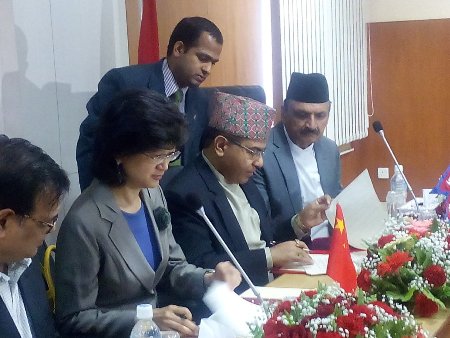 KATHMANDU, May 13 (Xinhua) — As Nepal and China signed a Memorandum of Understanding (MoU) on bilateral cooperation under the framework of the Belt and Road Initiative earlier this week, many believe that the deal will boost development of infrastructure and connectivity projects in the Himalayan country.
KATHMANDU, May 13 (Xinhua) — As Nepal and China signed a Memorandum of Understanding (MoU) on bilateral cooperation under the framework of the Belt and Road Initiative earlier this week, many believe that the deal will boost development of infrastructure and connectivity projects in the Himalayan country.
Various sections of society including mainstream media in Nepal have welcomed the government’s move to sign the MoU with China.
“It is indeed a historic milestone for Nepal to sign the deal with China under the Belt and Road framework that has opened up a new door with multiple opportunities for infrastructure development and economic growth,” connectivity expert Surya Raj Acharya told Xinhua on Saturday.
Cross broader highways, railways, transmission lines and internet connectivity will contribute to bringing drastic changes in Nepal’s socio-economic landscape, he said.
Acharya believes that the Belt and Road Initiative is an important agenda for Asia since the region has emerged as the hub of global economy.
The initiative will “improve physical connectivity and deepen economic integration among Asian countries and thereby unleash full potential of Asia,” Acharya said, adding that “the benefits that Nepal can reap by getting connected to the global value chain through China will be in an unimaginable scale.”
The MoU signed between Nepal and China was aimed at enhancing cooperation on promoting connectivity of facilities, trade connectivity, financial integration and connectivity of peoples.
Nepal’s Foreign Secretary Shanker Das Bairagi said that the country’s participation in the Belt and Road Initiative has brought new tremendous opportunities creating a win-win situation between China and Nepal.
Foreign Affairs Analyst Nishcal Nath Pandey told Xinhua on Saturday that Nepal’s participation in the initiative will open new prospects of opportunities both for China and Nepal.
Meanwhile, the Belt and Road Forum for International Cooperation to be held in Beijing has attracted huge attention from the government, media and various sections of society in Nepal. Mainstream daily newspapers, online media outlets, television channels have given coverage regarding the forum.
“The Belt and Road Forum is a good platform for Nepal to promote its investment potential in the field of infrastructure, energy and tourism,” Lekhnath Pandey, a diplomatic correspondent with the Kathmandu-based Himalayan Times Newspaper, told Xinhua.
Nepali Deputy Prime Minister Krishna Bahadur Mahara is leading a delegation to China to attend the forum in Beijing on Sunday and Monday.
“Our high level participation in the Belt and Road Forum shows that the Belt and Road Initiative is highly important for us and we want to reap benefits for achieving socio-economic development,” he told Xinhua.
The Silk Road Economic Belt and the 21st Century Maritime Silk Road, known as the Belt and Road Initiative, was proposed by China in 2013 with the aim of building a trade and infrastructure network connecting Asia with Europe and Africa along the ancient trade routes.

